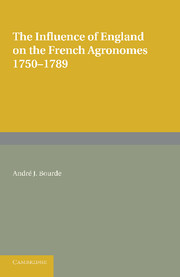Book contents
- Frontmatter
- Contents
- LIST OF ABBREVIATIONS
- Preface
- PART ONE THE PREPARATORY PERIOD 1700–50
- Chapter I French Agricultural Literature before 1750
- Chapter II The Discovery of English Agricultural Methods
- PART TWO DUHAMEL DU MONCEAU'S WORK
- PART THREE AGRARIAN REPERCUSSIONS OF THE NOUVEAU SYSTÉME
- PART FOUR HOW THE NEW HUSBANDRY WAS INTENDED TO ENRICH FRENCH AGRICULTURE
- PART FIVE SOME ASPECTS OF THE INTERNAL LIFE OF THE AGRONOMIC MOVEMENT
- Conclusion
- Appendix I
- Appendix II
- Bibliography
- Index
Chapter II - The Discovery of English Agricultural Methods
from PART ONE - THE PREPARATORY PERIOD 1700–50
Published online by Cambridge University Press: 05 June 2016
- Frontmatter
- Contents
- LIST OF ABBREVIATIONS
- Preface
- PART ONE THE PREPARATORY PERIOD 1700–50
- Chapter I French Agricultural Literature before 1750
- Chapter II The Discovery of English Agricultural Methods
- PART TWO DUHAMEL DU MONCEAU'S WORK
- PART THREE AGRARIAN REPERCUSSIONS OF THE NOUVEAU SYSTÉME
- PART FOUR HOW THE NEW HUSBANDRY WAS INTENDED TO ENRICH FRENCH AGRICULTURE
- PART FIVE SOME ASPECTS OF THE INTERNAL LIFE OF THE AGRONOMIC MOVEMENT
- Conclusion
- Appendix I
- Appendix II
- Bibliography
- Index
Summary
It WAS around the year 1750 that the French came to know the actual state of English agriculture. Until that time, the emphasis had been laid chiefly on political, social and ‘philosophical’ as ects of England. The manifestations of the country's life were known only to the purely intellectual or scientific circles.Gradually, however, following in Voltaire's footsteps, the number of travellers to England increased. They described and often published their impressions of a country still unfamiliar.The general public was kept informed of England's political and social life, of its literary productions and of its scientific discoveries. In addition, various aspects of the English countryside were described (often, naturally, as a means of propaganda).
The Abbé Coyer, in his- Noblesse Commergante, writes that England had begun to be transformed 50 years before, although the results of the transformation had become apparent only 20 years earlier. In comparing the descriptions of French and English landscapes in the mid-eighteenth century, one may well imagine how keen an interest the latter must have awakened in their French readers. In contrast to their own country, where agricultural life was on the whole wretched, these new descriptions showed a picture of a veritable Garden of Eden, of a country ‘always smiling’. In certain parts of this country, the prosperous farming had made of them, less a campagne than an ‘immense garden’. These descriptions corroborated Voltaire's almost incredible accounts of English peasants who ‘eat white bread, are well cloath'd and are not afraid of increasing their stock of cattle, nor of tiling their houses from any apprehension that their taxes will be rais'd the year following’. Thus England, the birthplace of philosophy and of the ideal government, could also boast of a wealthy and thriving countryside. Throughout that century and into the next one, England gained increasing admiration on that score. In most of the books on economic or English questions, published around 1750, praise of English agriculture and farming is practically never absent.
The archaic treatises on husbandry at the beginning of the century were lacking in details. Once or twice, however, in La Quintinie or Liger, examples of English methods can be found. In the interesting Dictionnaire Oeconomique of Chomel there are certain very precise hints of the new theories extracted from British authors.
- Type
- Chapter
- Information
- Publisher: Cambridge University PressPrint publication year: 2013



